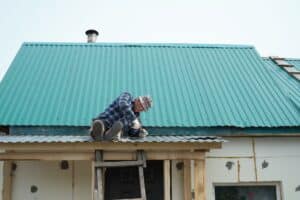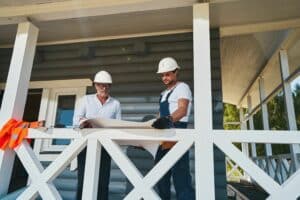Florida’s distinctive climate, characterized by hot and humid summers, frequent thunderstorms, and the ever-present threat of hurricanes, poses unique challenges for homeowners. One of the critical components of any home that’s significantly impacted by these climate factors is the roof.
In order to protect your property and family from Florida’s harsh weather conditions, it’s essential to choose the most appropriate roofing materials for your home, as well as the right maintenance and care practices.
At Stratus Roofing, we understand the importance of selecting the perfect roofing solution for Florida homeowners and are committed to helping you make informed choices.
In this insightful guide, we will explore the impact of Florida’s climate on your home’s roof, delving into various weather factors, such as intense heat, humidity, heavy rain, and hurricane-force winds.
We will discuss the advantages and disadvantages of popular roofing materials, such as asphalt shingles, metal roofing, and tile roofing, and provide advice on factors to consider when selecting the right materials for your specific needs. Additionally, we will offer expert tips on maintaining your roof to ensure it can withstand Florida’s climate challenges.
Armed with this knowledge, Florida homeowners can make confident, well-informed decisions about their roofing materials and maintenance practices. With the right roof choice and care, you can ensure your home remains protected in the face of Florida’s unique climate conditions and enjoy long-lasting peace of mind.
Heat and Humidity: Roofing Materials for High Temperatures
Florida’s intense heat and humidity during the summer months can stress certain roofing materials, causing them to wear, age, and degrade faster.
- Asphalt Shingles
While asphalt shingles are a popular and cost-effective roofing option, they can be subject to issues such as curling and granule loss when exposed to high temperatures and humidity. To mitigate these issues, homeowners may opt for specially designed cool roof shingles that help reflect sunlight, reducing heat absorption and prolonging the lifespan of the shingles.
- Metal Roofing
Metal roofing is highly reflective and can effectively combat the effects of heat and humidity. Available in a variety of colors and styles, metal roofs can provide both energy efficiency and aesthetic appeal. Some metal roofs also come with specialized coatings that further enhance their heat-reflective properties, making them an excellent option for hot climates.
- Tile Roofing
Tile roofing, particularly clay and concrete tiles, is incredibly durable and provides exceptional resistance to heat and humidity. Their natural thermal properties allow them to cope with Florida’s extreme temperatures without compromising performance or longevity.
Heavy Rainfall: Material Choices for Water Resistance and Durability
With Florida’s frequent thunderstorms and heavy rainfall, it’s crucial to select materials that can withstand substantial amounts of water and minimize the risk of leaks.
- Asphalt Shingles
Most asphalt shingles have a water-repellent coating to protect against rainwater penetration. However, it is vital to ensure that proper installation techniques are employed to secure their effectiveness against heavy rainfall.
- Metal Roofing
Metal roofing is inherently watertight, providing excellent resistance to heavy rainfall. Standing seam metal roofing, in particular, creates a virtually leak-proof barrier and is ideal for hurricane-prone areas.
- Tile Roofing
Tile roofs are designed to shed water quickly, making them highly suitable for regions with heavy rainfall. Additionally, their interlocking design enhances their water resistance and sturdiness under harsh weather conditions.
Hurricanes and High Winds: Wind-Resistant Roofing Materials
The threat of hurricanes and high winds in Florida makes choosing wind-resistant roofing materials a top priority for homeowners.
- Asphalt Shingles
When selecting asphalt shingles for hurricane-prone areas, look for products rated for high wind resistance, such as those with ASTM D3161 Class F (110 mph) or ASTM D7158 Class H (150 mph) wind ratings. Proper installation is also crucial to ensure the shingles remain firmly secured during high wind events.
- Metal Roofing
Metal roofing offers exceptional wind resistance, provided it is installed correctly. Panels interlock and secure directly to the roof deck, creating a strong and durable surface capable of withstanding hurricane-force winds when properly installed.
- Tile Roofing
Clay and concrete tile roofs are highly wind-resistant when installed with proper adhesion and fastening methods. In general, they are more likely to survive high winds intact, reducing the risk of damage to your home during severe weather events.
Considering Longevity, Energy Efficiency, and Maintenance Needs
Aside from weather resistance, factors such as longevity, energy efficiency, and maintenance requirements also play a crucial role in selecting the appropriate roofing material for your Florida home.
- Asphalt Shingles
With an average lifespan of 15-30 years, asphalt shingles provide a more budget-friendly roofing option. They may require more frequent maintenance and replacement compared to other materials.
- Metal Roofing
Boasting an impressive lifespan of up to 50 years or more, metal roofing can be a more durable and long-lasting choice. Although it may have a higher upfront cost, it often requires less maintenance and is more energy-efficient than traditional shingles, resulting in long-term savings.
- Tile Roofing
Clay and concrete tile roofs are known for their exceptional longevity, often lasting 50 years or more with proper maintenance. While the initial cost can be higher than other materials, their durability, minimal maintenance requirements, and energy efficiency make them an attractive long-term investment for Florida homeowners.
Conclusion
As a Florida homeowner, understanding the impact of Florida’s climate on your roof and selecting the best material to withstand those challenges is essential to safeguarding your property and family. By considering factors such as heat and humidity, heavy rainfall, high winds, and prioritizing features such as longevity, energy efficiency, and maintenance, you can make an informed decision that best suits your home’s unique needs.
Stratus Roofing’s knowledgeable and experienced team is here to help guide you through the process of choosing the perfect roofing material for your Florida home, ensuring that your roof stands up to Florida’s challenging climate while maintaining its efficiency and beauty for years to come.
Looking for the best roofing contractors in Orlando? Look no further than Stratus Roofing! Our team of experts is ready to help you select the perfect roofing material for your Florida home. Contact us today for personalized guidance and professional roofing services tailored to your needs. Don’t wait – get in touch with us now to schedule your consultation!







